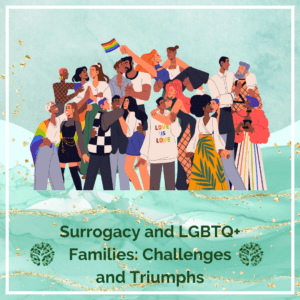
Surrogacy has become an increasingly popular family-building option for LGBTQ+ individuals and couples who wish to have biological children. However, the journey to parenthood for LGBTQ+ families through surrogacy comes with unique challenges, as well as powerful triumphs that showcase resilience and love. Let’s explore the distinctive aspects of surrogacy for LGBTQ+ families, the hurdles they face, and the victories they achieve along the way.
1. Why Surrogacy is Important for LGBTQ+ Families
For many LGBTQ+ individuals and couples, surrogacy offers the possibility of building a family that shares a genetic connection. Gay men, for instance, often require the help of both an egg donor and a surrogate to have a biological child, while lesbian couples may use surrogacy to overcome infertility challenges or choose surrogacy if both partners want to be closely involved in the pregnancy process. Transgender and non-binary individuals may also turn to surrogacy as an option for parenthood, especially if they face medical or personal barriers to pregnancy.
Surrogacy allows LGBTQ+ families to take an active role in the creation of their families, providing them with a deeply personal experience and the chance to be involved throughout the pregnancy journey. However, this process isn’t always simple or straightforward.
2. Challenges Faced by LGBTQ+ Families in Surrogacy
LGBTQ+ families often encounter legal, financial, and social challenges that can complicate their surrogacy journey.
- Legal Hurdles: Surrogacy laws vary widely depending on where you live. Some countries or states have surrogacy-friendly laws, while others may prohibit surrogacy entirely or make it more difficult for LGBTQ+ parents to establish their legal rights. Gay men, for example, may face challenges in securing legal parentage, especially if surrogacy agreements or parental rights aren’t recognized in their state or country. Working with experienced legal professionals is crucial to navigating these legal complexities.
- Financial Considerations: Surrogacy is a costly process for anyone, but LGBTQ+ families may face additional financial burdens due to the need for both an egg or sperm donor and a surrogate. The expenses involved include legal fees, medical procedures, agency costs, and compensation for the surrogate. The financial strain can be a significant obstacle, especially for younger LGBTQ+ couples or individuals who may not have the same financial resources as others.
- Social and Emotional Challenges: LGBTQ+ families also face social stigmas and bias that heterosexual couples may not encounter during the surrogacy process. This can include discriminatory treatment from healthcare providers, adoption agencies, or even extended family members. The emotional toll of navigating these societal attitudes can be draining. However, many LGBTQ+ parents have found strength in the supportive communities that have emerged to advocate for their rights and experiences.
3. Triumphs in Surrogacy for LGBTQ+ Families
Despite the obstacles, LGBTQ+ families have achieved significant triumphs in their surrogacy journeys, celebrating victories in love, inclusion, and family-building.
- Legal Victories: In recent years, there have been notable legal victories for LGBTQ+ families regarding surrogacy. Many states and countries have adopted more inclusive surrogacy laws, recognizing the rights of LGBTQ+ parents and making it easier to establish legal parentage. For example, parentage laws in some states now allow both members of a same-sex couple to be recognized as legal parents from birth, without the need for additional legal proceedings like second-parent adoptions.
- Increased Acceptance and Support: The surrogacy journey can be incredibly rewarding, and many LGBTQ+ families have found increasing acceptance and support within the medical, legal, and surrogacy communities. Specialized surrogacy agencies and fertility clinics have emerged to cater to the unique needs of LGBTQ+ individuals and couples, offering guidance and understanding that help them feel more confident and empowered.
- Building Strong Families: Of course, the greatest triumph is the creation of loving families. LGBTQ+ parents often describe the profound sense of fulfillment and joy that comes from welcoming their child into the world. Surrogacy enables these families to be part of a deeply meaningful process, with many LGBTQ+ parents forming lasting bonds with their surrogates, who play an important role in helping them realize their dreams of parenthood.
4. Creating a Supportive Surrogacy Journey
For LGBTQ+ families, finding the right support system is crucial for a successful surrogacy experience. This includes working with surrogacy professionals who are experienced in LGBTQ+ family-building, such as agencies, fertility clinics, and legal experts. Joining LGBTQ+ parenting groups and online communities can also provide valuable emotional support, resources, and guidance.
Having open, honest communication with your surrogate is another essential aspect of creating a positive journey. Many LGBTQ+ parents have found that building a strong, respectful relationship with their surrogate enhances the experience for everyone involved.
Conclusion
Surrogacy offers LGBTQ+ families a powerful and life-changing path to parenthood. While the journey may come with challenges—legal, financial, and emotional—the triumphs far outweigh the hurdles. With increasing acceptance, supportive networks, and legal progress, LGBTQ+ families are making their mark in the surrogacy world, creating strong, loving families built on the foundation of love, dedication, and resilience. Family Choice Surrogacy supports the LGBTQ+ community on their journey to parenthood and family. Surrogacy is not just a way to have children; it’s a testament to the strength and determination of LGBTQ+ individuals and couples to build the families they’ve always dreamed of.
